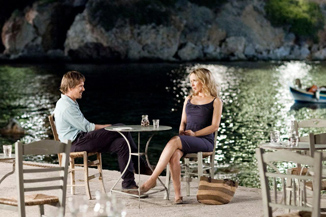|
|
The 400-Word Review: Before MidnightBy Sean CollierJune 17, 2013
So much for the romance. After a few extended scenes, some mercifully including other characters, we get back to the meat of the series. Jesse and Céline slowly wander to a small hotel in an Italian village; their conversation gradually creeps towards the unhappiness the two share now that they have to be full-time lovers. Some will see this as the necessary conclusion to the series, appropriate and true. Unfortunately, Before Midnight is also soporifically boring. Take that nervous energy out of the equation and you have people dealing with routine problems that have been dealt with on-screen dozens of times (by, sorry, better performers.) And their longest conversations are still written in the voices of a couple getting to know one another better. If they’re still talking like that after nine years, then the bigger problem is some sort of creeping amnesia. The only way to look on Before Midnight favorably is to be blinded by the previous entries in the series. Unfortunately, this final chapter breaks the spell of its predecessors. Sean Collier is the Associate Editor of Pittsburgh Magazine and a member of the Broadcast Film Critics Association. Read more from Sean at pittsburghmagazine.com/afterdark
[ Read more 400 word movie reviews ]
[ View other movie reviews ]
[ View other columns by Sean Collier ] [ Email this column ]
|

|
|
|

|
Thursday, October 31, 2024
© 2024 Box Office Prophets, a division of One Of Us, Inc.


